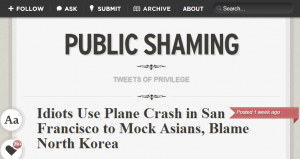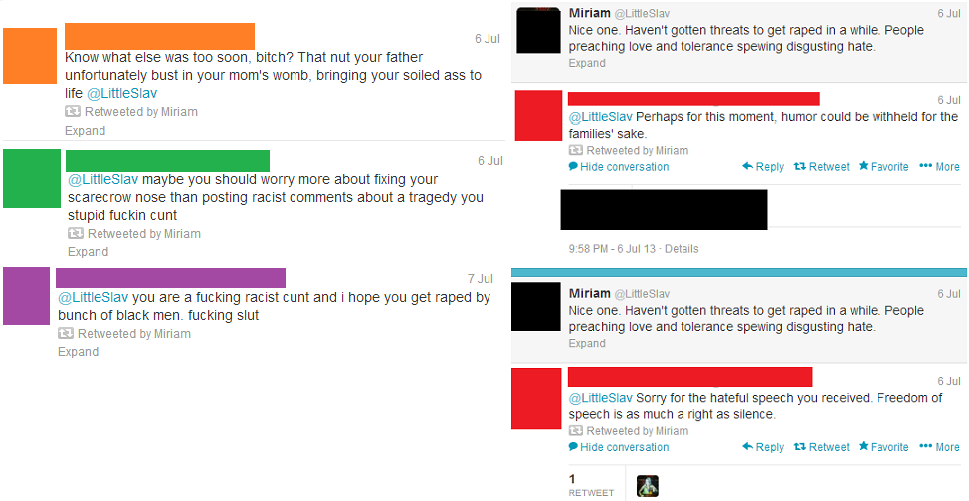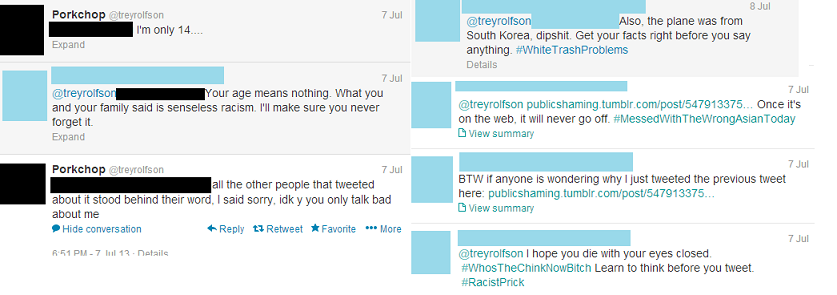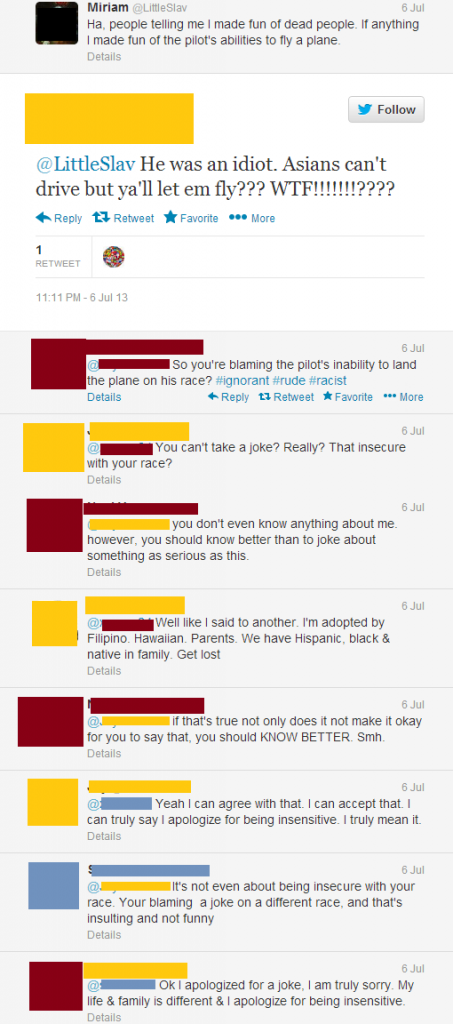Shame On(line) You: Social Activism, Racist Tweets, and Public Shaming
 It is highly feasible that there is a shaming website (or at least a post) for everything: parents, dogs, cats, lizards, robots, philosophers, English grad students, and yarn. While most of the examples above are created and positioned as humorous entertainment, public shaming extends well before and beyond social media and also has strong roots in social activism, ranging from signs at political rallies to tweets about python programmers making dongle jokes (and perhaps the most visible example of online shaming this year).
It is highly feasible that there is a shaming website (or at least a post) for everything: parents, dogs, cats, lizards, robots, philosophers, English grad students, and yarn. While most of the examples above are created and positioned as humorous entertainment, public shaming extends well before and beyond social media and also has strong roots in social activism, ranging from signs at political rallies to tweets about python programmers making dongle jokes (and perhaps the most visible example of online shaming this year).
As the latter example indicates, it is no surprise then that the political aspects of large-scale public shaming–which can be defined as a form of punishment that purposely attempts to humiliate someone by showcasing the person(s) and their offensive actions in a public space–would intersect with the “ordinary” social media user. No longer applicable to mainly public figures, now even physically “local” acts of shaming, such as holding a sign in a street, can easily go viral through retweets and posts. One such site is the tumblr Public Shaming, an uncensored online “hall of shame” that highlights everyday, yet highly troublesome (e.g. racist, sexist, etc.) social media posts. As creator Matt Binder describes in a Racialicious interview, his site’s “point is to show…readers that these [ignorant] people exist” and by “calling out” these people on a public stage, Binder “thought that was an interesting way to go about [debating with someone].” He goes on to hesitantly state that “there is social activism involved in [what he does],” although he massively backtracks on these statements later.
Although one Racialicious commenter described Binder’s interview as “self-congratulatory back-patting,” Public Shaming does have its aspects of activism as it sheds light on comments that illustrate ideologies that create and maintain acts of social injustice. While this action of drawing attention to injustice is very important, it is only the first step. To induce social change (which arguably is the key principle of activism), I believe some form of discussion and action must occur and be reasonably maintained after inequality has been publicly exposed. Optimistically, it is in these debates that ideologies begin to subtly evolve and mutual understandings of different groups can be slowly established. In this case, Public Shaming is very limiting; Binder disturbingly states clearly in the interview he has no desire to see if people on his site change and rarely engages with these people beyond his tumblr post.
To examine the dialogue that results from Public Shaming, we must follow the site’s followers, who very often establish lines of communication with those in the “hall of shame” over social media. For the rest of this post, I wish to focus on a post revolving around racist tweets in the aftermath of the Asiana Airlines crash in San Francisco and explore how and what kinds of dialogues about race are or are not occurring. [Note: Due to my uncertainty with the ethics of public shaming, I have blocked out most the the users names to avoid becoming a shaming post myself (though I assume most of you could track them down). I have kept twitter handles of the offending parties as they are already exposed in the link above. To ease reading, I have color coded key players, while black blocks consist of multiple users.]
Similar to the response to Adria Richards, the left image above (click for larger images) clearly shows that reactions to public shaming can be violent, sexist, and much more offensive than @LittleSlav’s original tweet of “Asians can’t fly either.” It is obviously problematic to counter a racist statement with another racist (and sexist) statement. This create a vicious cycle where both sides use each others’ hate speech to defend and qualify their own hate speech, and by positioning themselves as both victims of a hurtful comment, both ignore their own words. To be clear, nobody, including @LittleSlav (who appears to be a 30-year-old White/European American Female), deserves to be threatened with rape and she has a legitimate right to be a victim. I also understand there are complex hierarchies of class, gender, and race at play and power is moving over uneven terrains (i.e. these threats/”ironic jokes” can never be equally comparable). Nevertheless, this does not entirely negate the offensiveness of @LittleSlav’s original tweet. Instead of answering to the issue of her comment from calmer and more logical users like the one in Red, the discussion is not one of race or even issues of tastefulness, but deflected to the realm of freedom of speech and a never winnable (or useful) debate about who has it worse. Again, @LittleSlav raises a fair point, but is unable to recognize that an act of hate speech should not be the reasoning and/or defense behind another instance of hate speech and this applies to all parties involved.
For @treyrolfson, a 14-year-old white male who tweeted a “chink” joke his dad told him, the situation is very similar (see more here). For the user in Light Blue, a college-aged Asian American male, the issue of race is brought up, but only for the topic of insults or a launching pad for hashtaging threats of physical violence. In addition to falling into the same logical fallacies mentioned above, I would like to quickly note that many of these aggressive and violent tweets are coming from college-aged Asian American males, including Green and Purple above (although this is not universal as Orange is an African American female and Red is an Asian American male). Perhaps channeling their inner Angry Asian Man (or Woman!), this aggression is interesting as it may be a counter to larger portrayals of weak and emasculated Asian (American) males often present in the media. Still, these comments follow in the same vein as @LittleSlav, where they do not realize how their Asian American identities intersect with other ethnicities and aspects of gender and class. This produces shallow and contradictory discourses of race that don’t seem to be pushing for long-term social change.
For many twitter users, accounts become private or deleted, effectively shutting down any chance of social change as conversations never fully develop. In this case, the lesson is not an increased understanding of race, but rather one about privacy and how you shouldn’t list your workplace on twitter if you are to make racist comments.
To end on a positive note, while I am hesitant to say online public shaming is a particularly successful tool for social activism, it does show people–especially those supposedly apathetic kiddos–do care about issues of race, even if there are many problematic effects of this. People are active and angry, which can sometimes be good. And for all the rape comments, there is at least the potential space for dialogue and change in 140 characters or less:





